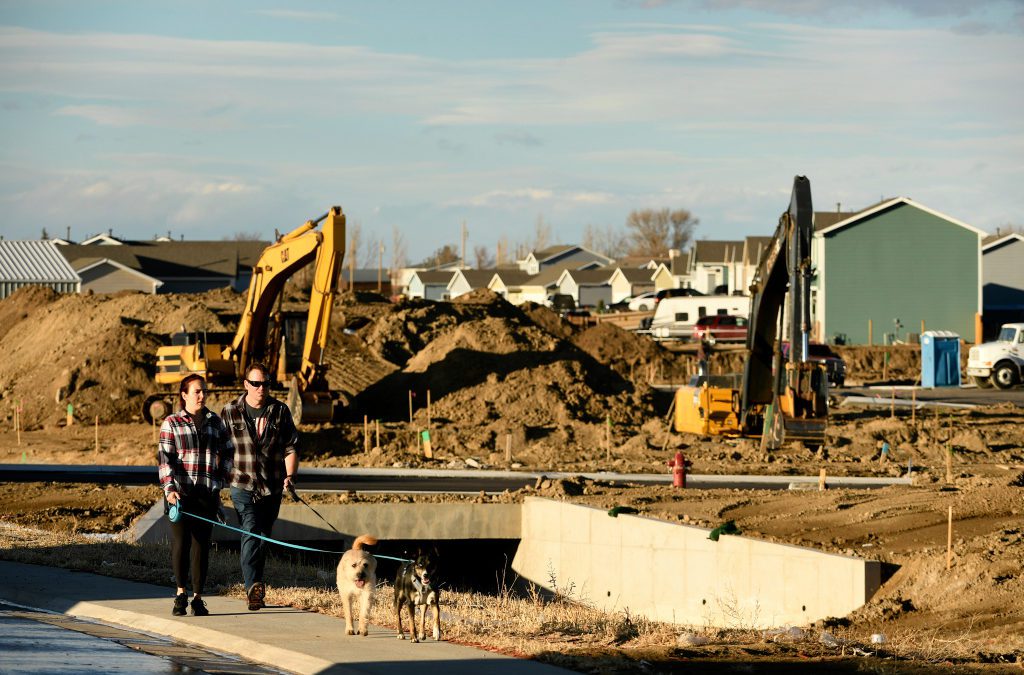A lawsuit by developers to force an Adams County metro district they built to pay up millions of dollars they say they’re owed has led to a countersuit alleging organized crime and fraud.
Homebuilder Lennar Colorado and developer Stratus Amber Creek sued the Amber Creek Metro District in March 2021 claiming they’re owed nearly $4 million for costs they incurred making infrastructure improvements at the subdivision.
The district, in a counter-suit filed April 30, said it’s been victimized by the developers, who used Colorado’s metro district laws to “fleece” it out of millions of dollars and “used their control over the district as a profit center.”
The lawsuit is the first in which a resident-controlled metro district is taking on the developers who sat on its board of directors and passed the laws governing how it would operate.
Amber Creek was formed in 2006 and Lennar and Stratus came on board in 2014, state records show.
Lennar is one of the nation’s largest homebuilders and a participant in dozens of metro districts across Colorado. Stratus is run by the Dean family, developers of several metro districts, according to records filed with the Colorado secretary of state.
In nearly every case, developers create a metro district and vote themselves, family members, or employees onto the district board of directors before any homes are built. From there they frequently make decisions that affect hundreds of future homeowners, including property tax levies to pay for the infrastructure the developers install. Many of those agreements cannot be undone.
The costs are paid for with bonds the district sells and that future homeowners repay through additional property taxes the developers establish before any homes are actually built. Repayment terms can run up to 40 years or longer.
Amber Creek residents took control of the district’s board in May 2018, according to the lawsuit, but not before Lennar and Stratus representatives on the board “rushed to certify prior infrastructure costs of approximately $15 million” in the weeks before the election to ensure they would be paid.
One of the Amber Creek bonds, issued in 2017, projected interest rate returns as high as 74%, or payments totaling “a minimum of $25.8 million on a debt with a face value of $1.7 million,” the counter-lawsuit says. “A 1,370% return.”
The counter-suit also claims Lennar and Stratus told the city of Thornton, where the development is located, that the public infrastructure they built is worth about $7 million.
The builders valued the roads within the district at $2.2 million but sought payment from the district totaling more than $8 million.
“The Amber Creek Metropolitan District was formed ostensibly to facilitate the construction of public infrastructure improvements, such as roads and sewers, within … the district,” the counter-lawsuit reads. “In reality, (Lennar and Stratus) and their accomplices managed Amber Creek as an enterprise under the Colorado Organized Crime Control Act … engaged in serial acts of mail fraud, wire fraud, usury, (and) bribery … to perpetrate their scheme.”
Attorneys for Lennar told The Post in an email that the company does not comment on pending litigation, as did the attorneys for Stratus.
“This will only add to the financial hardship for our community,” Amber Creek resident Jenn Barrett said about the lawsuit by Lennar and Stratus. “I am at a loss for words as to how this will impact future costs associated with our increasing property taxes, which increased 300% from last year.”
The Post in 2019 published a comprehensive investigation into the inner workings of the state’s more than 2,000 metro districts, virtually the exclusive method used to construct new homes in Colorado.
Among its findings was how some developers purchased the very bonds they had authorized while members of the metro district board they were building, not only guaranteeing high returns but, in some cases, that the profits were tax-free.
Amber Creek was among them. The district issued $17 million in senior bonds in 2017 to investors at varying interest rates up to 7.75%. Another $1.7 million in junior bonds went to Lennar at 10.7% with an expected payday of $25.8 million over 30 years, The Post found. The effective interest rate: 39.6%.
In its lawsuit, Lennar claims the agreements it signed in 2014 with Stratus – each with members on the district’s board of directors – guaranteed its repayment through bond proceeds.
One of those infrastructure projects was a widening of 136th Avenue, which the Lennar/Stratus lawsuit says was “for the benefit of the district and its residents.”
The companies, however, took advantage of their position controlling the district’s construction costs and its board, according to the counter-lawsuit.
The companies sought $2.4 million for expanding the north side of the five-lane roadway, a project, according to the counter-lawsuit, “that was originally projected by Stratus and Lennar to cost approximately $340,000.”
This content was originally published here.

